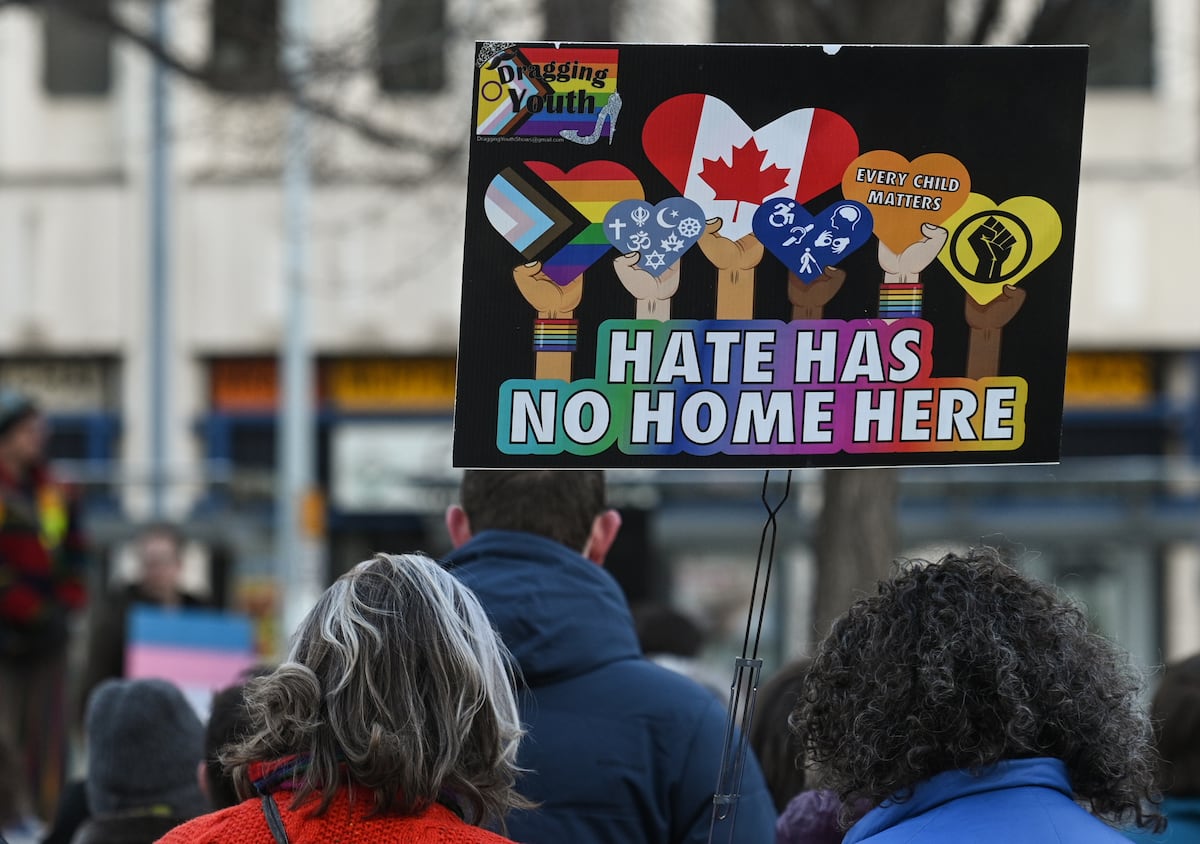“In the first 24 hours after Trump’s re-election, we received 1,177 requests for assistance from the United States. Fifty-one percent of these requests were from trans people: 35% from trans women, 16% from trans men,” says Timothy Chan, spokesperson for Rainbow Railroad, an NGO with offices in Canada and the U.S. that helps LGBTQ+ people experiencing persecution and violence start a life in another country. Panicked by a government that threatens their civil rights, many LGBTQ+ Americans, especially trans people, are seeking to immigrate to Canada. Some are even requesting humanitarian asylum. Hannah Kreager, a 22-year-old American, is one of them.
Three months ago, Kreager decided it was time to leave her country. “The [U.S.] federal government is threatening to criminalize trans identities,” she explains. So, in April, she drove 1,000 miles from her hometown of Tucson, Arizona, to Calgary, in the Canadian province of Alberta, where she has lived ever since.
Like her, many American citizens have considered fleeing to their northern neighbor. The avalanche of aid requests received by Rainbow Railroad represents “the largest number received in a single day from a single country,” Chan notes. To put this in perspective, at the height of the Afghanistan crisis (in August 2021), the peak number of daily requests was 119.
“So far in 2025, we have received 3,524 applications from U.S. residents; a 994% increase compared to the same period last year,” Chan emphasizes. To give an idea of the scale of the crisis, the organization receives an average of 10,000 applications annually from around the world. This NGO — whose name recalls the Underground Railroad, the network of secret routes established in the 18th century to transport Black people from slave-owning areas of the U.S. to abolitionist territories — has been collaborating since June 2023 with the Canadian Government’s Refugee Assisted Program, through which various organizations submit to the Canadian government the profiles of potential refugees seeking to settle in the country.
“There have been threats to implement ‘gender fraud’ laws [which make it a crime for official documents to show a gender other than the one recorded at birth]. They’re changing voter ID regulations, requiring all IDs to match, which would prevent people like me from voting,” Kreager says. “They’re erasing information about trans people from government websites and encouraging dangerous behavior in society — citizens now feel empowered to act hatefully without being punished for it.”
Kreager’s passport and birth certificate don’t reflect her name or gender: “I started hearing stories of trans people with X markers [indicating that a person does not identify as male or female] on their documents — like me — who were getting their passports returned shredded when they tried to update them,” she says.
A rumor about the possible implementation of martial law, which began circulating on social media in April, led her to decide to leave the country, as the idea of living in a police state without proper documentation did not seem like a viable option.
 Donald Trump after signing an executive order banning trans women from participating in women’s sports.The Washington Post (The Washington Post via Getty Im)
Donald Trump after signing an executive order banning trans women from participating in women’s sports.The Washington Post (The Washington Post via Getty Im)
In fact, Kreager knew she wanted out “as soon as Trump won his second term.” During his election campaign, the Republican laid out a deeply anti-trans rhetoric: he pledged to roll back long-standing rights if elected, vowing, among other things, to punish doctors and hospitals that provide gender-affirming programs and to ban trans women from competing in sporting events. Since taking office, and fulfilling his campaign promises, the U.S. president has signed 12 anti-trans executive orders, according to Trans Legislation Tracker, an independent research organization that tracks bills affecting trans people across the U.S.
The Rainbow Railroad spokesperson’s account is echoed by Canadian immigration law firms; many report receiving an influx of inquiries from American transgender people about moving to Canada. One such firm is Smith Immigration Law, whose founder, Adrienne Smith, notes that “there has been a significant uptick in the number of people urgently seeking to leave the U.S., whether through the refugee protection program, immigration programs, or spousal sponsorship.”
Smith says that several of the people who have contacted her seeking representation describe different forms of persecution: “Lack of healthcare, the inability to have their official documents reflect their correct gender, officials who feel emboldened to deny them services… There are several types of abuse that the community is currently experiencing.”
A group of people protested in New York after the U.S. Supreme Court upheld a law banning certain medical care for transgender youth.Kylie Cooper (REUTERS)
However, despite the evidence and Canada’s history of welcoming LGBTQ+ refugees, many experts are skeptical that Americans’ asylum claims will ultimately be accepted. From Rainbow Railroad, Chan clarifies that in addition to demonstrating that their experience in the U.S. falls under what is legally considered persecution, “applicants must prove that their government is unable or unwilling to protect them, and that they cannot live safely anywhere in the country. This represents a particular challenge for American citizens, as the country has many of the typical indicators of a safe democratic state, which, furthermore, has historically been a place of welcome for LGBTQ+ refugees from around the world.”
Although federal laws currently exist in the U.S. that target LGBTQ+ individuals, the issue, explains attorney Smith, is accepting that these laws have directly affected asylum seekers. “Then there’s the question of how these laws will be enforced in different states; whether there are governors who will actively disobey some of these federal laws,” she clarifies. “We have to figure out how these executive orders will be enforced in places like California or New York.”
This is called “internal flight or relocation alternative,” which, in the context of asylum law, refers to the possibility for a person seeking refuge from persecution to find a safe area within their own country, rather than being forced to migrate.
A serious situation
There are lawyers who believe the situation is “serious enough” to allow asylum claims to be successful in Canada, such as Calgary-based Yameena Ansari, who advises Hannah Kreager. A few months ago, she recommended she file an asylum application.
“My client has an X marker in her passport, even though she’s a woman. She had an appointment in February to change this on her passport, but she canceled it because she was afraid of losing the document. She didn’t want that to happen to her because she needs a passport to leave the country.” She adds: “My client would be in a country where the political climate is against her, where she can’t even vote to change course, and where she can’t leave because her documents could be revoked.”
Since arriving, Kreager has been trying to start over in Calgary. She lives with a friend, and despite the worries of starting over in a new place and looking for work in a foreign country, she prefers this temporary instability to the “darkness and fear” she was feeling back home: “It’s really tough waking up and seeing the headline of the day read, ‘You’re banned.’ It’s like you don’t exist.” She’s hopeful that her case will be successful: “I hope it sets a precedent that allows other trans people to leave the U.S.”
Sign up for our weekly newsletter to get more English-language news coverage from EL PAÍS USA Edition
